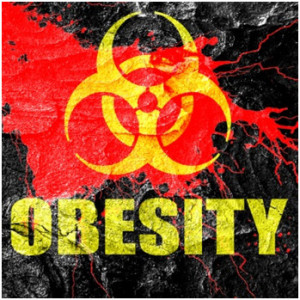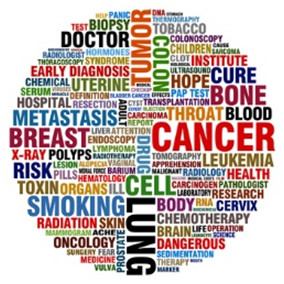Is The Obesity Epidemic Killing Us?
Author: Dr. Stephen Chaney
Does obesity cause cancer?
 You probably already know that we are in the midst of a world-wide obesity epidemic. If not, here are some of the alarming statistics that characterize that epidemic:
You probably already know that we are in the midst of a world-wide obesity epidemic. If not, here are some of the alarming statistics that characterize that epidemic:
- The global prevalence of obesity has increased by 27.5% between 1980 and 2013.
- 35% of the adult population worldwide is now overweight (BMI ≥ 25), including 12% who are classified as obese (BMI ≥30).
- According to the NIH the situation is even worse in developed countries like the US where 75.1% of adults are now overweight, including 35.7% who are obese, and 6.3% who are very obese (BMI ≥40).
Unfortunately, overweight and obesity are not benign. You probably already knew that those excess pounds increase your risk of diabetes, heart disease, kidney failure and much more. You probably also knew that those excess pounds increase your risks of certain types of cancer such as colon, rectal, kidney, pancreatic, postmenopausal breast, ovarian and uterine cancer.
It’s been a little more difficult to determine just how much obesity increases cancer risk. However, a recent study suggests that the increased risk could be quite significant. In fact, if this study is correct, obesity may only be second to smoking as a preventable cause of cancer. The truth might just scare you skinny!
Does Obesity Cause Cancer?
 The International Agency For Research On Cancer did a worldwide study, (Arnold et al, The Lancet Oncology 16: 36-45, 2015), in which they looked at the effect of BMI on cancer incidence in adults aged 20 years or older. The BMI data was collected in 2002 and was segregated by sex and age groups. Recognizing that cancer takes decades to develop, they then collected data on newly diagnosed cancers in adults 30 and older in the same countries in 2012. They were determined to get closer to answering the question, does obesity cause cancer?
The International Agency For Research On Cancer did a worldwide study, (Arnold et al, The Lancet Oncology 16: 36-45, 2015), in which they looked at the effect of BMI on cancer incidence in adults aged 20 years or older. The BMI data was collected in 2002 and was segregated by sex and age groups. Recognizing that cancer takes decades to develop, they then collected data on newly diagnosed cancers in adults 30 and older in the same countries in 2012. They were determined to get closer to answering the question, does obesity cause cancer?
By comparing BMIs in 2002 with the incidence of newly diagnosed cancers 10 years later they were able to calculate the effect of excess body weight (BMI ≥25) on cancer incidence. The results were startling:
- They estimated that 481,000 new cases of cancer in 2012 in adults over 30 were attributable to excess weight.
- That represents 3.6% of all new cancer cases, which makes overweight second only to smoking as a preventable cause of cancer.
- Uterine cancer, postmenopausal breast cancer, and colon cancer accounted for 63.6% of all cancers caused by overweight. Other cancers affected by excess weight were rectal cancer, pancreatic cancer, kidney cancer, gallbladder cancer, and ovarian cancer.
- The effect of excess weight on cancer risk was almost 3-fold greater for women (5.4% of new cancer cases) than for men (1.9% of new cancer cases).
- In North America 111,000 new cases of cancer in 2012 for adults over 30 were attributable to excess weight. That represents 3.5% of all new cancers in men and 9.4% of all new cancers in women.
- A quarter (about 118,000) of the worldwide cancer cases related to high BMI in 2012 could be attributed to the increase in BMI that has occurred since 1982.
The authors concluded “These findings emphasize the need for a global effort to abate the increasing numbers of people with high BMI. Assuming that the association between the high BMI and cancer is causal, the continuation of current patterns of population weight gain will lead to continuing increases in the future burden of cancer.”
What Does This Study Mean For You?
We have to stop kidding ourselves. That excess flab isn’t harmless. It is killing us, and cancer is a particularly gruesome way to go. It’s time to get serious about weight loss. Here are my top 5 tips for lasting weight loss.
 Eat healthy low calorie meals and snacks with plenty of protein so that you maintain muscle mass while you are losing fat.
Eat healthy low calorie meals and snacks with plenty of protein so that you maintain muscle mass while you are losing fat.- Avoid the fad diets. You don’t need to restrict carbohydrates or fats. You just need to focus on fresh fruits and vegetables, healthy proteins and modest amounts of healthy fats and healthy carbohydrates.
- Find an exercise program you like and stick with it every day.
- Focus on true lifestyle change rather than short term diets. A good strategy is to make one healthy change at a time rather than trying to do everything at once.
- Change how you think about food, think about exercise, and think about your ability to make the kinds of changes that will lead to permanent weight loss. Don’t think of yourself as a fat person who is trying to lose weight. Think of yourself as a skinny person who happens to have a few extra pounds that are on their way out.
Of course, getting to a healthier weight isn’t the only change you want to make if you are trying to reduce your risk of cancer. Here are my top 7 lifestyle change suggestions (besides weight loss) for reducing cancer risk.
 If you smoke, stop. No ifs, ands, or buts. Smoking is still the #1 cause of cancer.
If you smoke, stop. No ifs, ands, or buts. Smoking is still the #1 cause of cancer.- Eat a healthy diet (including supplements to fill the gaps).
- Eat plenty of fresh fruits and vegetables, especially those that are good sources of cancer-fighting antioxidants, carotenoids, flavonoids, and polyphenols.
- Eat fish and fish oil supplements to make sure that you get plenty of omega-3 fatty acids.
- Minimize saturated fats and avoid trans fats. Substitute olive oil for vegetable oils whenever possible.
- If you drink alcohol, drink it in moderation.
- Avoid sun exposure as much as possible, and use sunscreen when outdoors.
- Eat healthy proteins.
- Minimize consumption of red meats and processed meats.
- Use chicken, fish and vegetable proteins whenever possible.
- Soy protein is particularly helpful for reducing the risk of breast cancer. (Yes, those scary blogs about soy and breast cancer are wrong. For accurate information, just go to https://chaneyhealth.com/healthtips and type soy in the search box).
- Get plenty of exercise.
- Get regular check-ups.
So, does obesity cause cancer? I think you now know the answer.
The Bottom Line
- A recent study has shown:
- 481,000 new cases of cancer worldwide each year are attributable to excess weight.
- That represents 3.6% of all new cancer cases, which makes overweight second only to smoking as a preventable cause of cancer.
- Uterine cancer, postmenopausal breast cancer, and colon cancer accounted for 63.6% of all cancers caused by overweight.
- The effect of excess weight on cancer risk was almost 3-fold greater for women (5.4% of new cancer cases) than for men (1.9% of new cancer cases).
- In North America 111,000 new cases of cancer for adults over 30 are attributable to excess weight. That represents 3.5% of all new cancers in men and 9.4% of all new cancers in women.
- That excess flab isn’t harmless. It is killing us, and cancer is a particularly gruesome way to go. For my top 5 tips for lasting weight loss and my top 7 tips for reducing your risk of cancer, read the article above.
These statements have not been evaluated by the Food and Drug Administration. This information is not intended to diagnose, treat, cure or prevent any disease.
